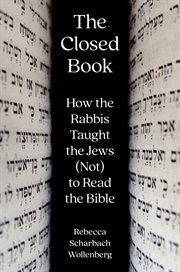Nonfiction
eBook
Details
PUBLISHED
Made available through hoopla
DESCRIPTION
1 online resource
ISBN/ISSN
LANGUAGE
NOTES
Rebecca Scharbach Wollenberg is assistant professor of Judaic studies at the University of Michigan. A groundbreaking reinterpretation of early Judaism, during the millennium before the study of the Bible took center stage Early Judaism is often described as the religion of the book par excellence-a movement built around the study of the Bible and steeped in a culture of sacred bookishness that evolved from an unrelenting focus on a canonical text. But in The Closed Book, Rebecca Scharbach Wollenberg argues that Jews didn't truly embrace the biblical text until nearly a thousand years after the Bible was first canonized. She tells the story of the intervening centuries during which even rabbis seldom opened a Bible and many rabbinic authorities remained deeply ambivalent about the biblical text as a source of sacred knowledge. Wollenberg shows that, in place of the biblical text, early Jewish thinkers embraced a form of biblical revelation that has now largely disappeared from practice. Somewhere between the fixed transcripts of the biblical Written Torah and the fluid traditions of the rabbinic Oral Torah, a third category of revelation was imagined by these rabbinic thinkers. In this "third Torah," memorized spoken formulas of the biblical tradition came to be envisioned as a distinct version of the biblical revelation. And it was believed that this living tradition of recitation passed down by human mouths, unbound by the limitations of written text, provided a fuller and more authentic witness to the scriptural revelation at Sinai. In this way, early rabbinic authorities were able to leverage the idea of biblical revelation while quarantining the biblical text itself from communal life. The result is a revealing reinterpretation of "the people of the book" before they became people of the book. "Wollenberg . . . deserves praise for highlighting rabbinic views that are often glossed over and for her novel readings of various Talmudic narratives that suggest the rabbis viewed written scripture as flawed." "The Closed Book is an exciting and important contribution to the field of rabbinics, with significance for understanding the development of the Hebrew Bible. It also presents an insightful history of modern biblical scholarship. This is a great book, and a unique and valuable contribution to the field."-Laura Suzanne Lieber, Duke University "This learned and innovative book upends conventional assumptions about the centrality of a fixed written Bible in rabbinic thought and practice. By illuminating the performative modes by which the rabbis created and transmitted the Torah's meaning, Wollenberg has made a major contribution to our understanding of revelatory knowledge in early Judaism."-Judith H. Newman, author of Before the Bible "Displaying an innovative, creative critical imagination, The Closed Book is a major scholarly accomplishment that sheds much-needed light on its subject. Rebecca Scharbach Wollenberg shows a complete fluency in the relevant scholarship and moves deftly between biblical studies, linguistics, rabbinics, anthropology, and literary theory. This is a deeply impressive and very important book."-Mark Leuchter, Temple University "Through close readings of rabbinic sources, Rebecca Scharbach Wollenberg upends a set of assumptions so basic to biblical studies scholarship as to be imperceptible to those who hold them, and offers an entirely new paradigm for construing the rabbinic relationship to scripture-a paradigm with great explanatory potential."-Christine Hayes, author of What's Divine about Divine Law? "The Closed Book challenges readers to rethink the role that the Tanakh played in the formation of Judaism. In her compelling and eloquent book, Wollenberg argues that the Written Torah was increasingly closed. The Tanakh was thus unread or misread, as rituals and teachings were reshaped into histories that have influenced the history of Judais
Mode of access: World Wide Web







